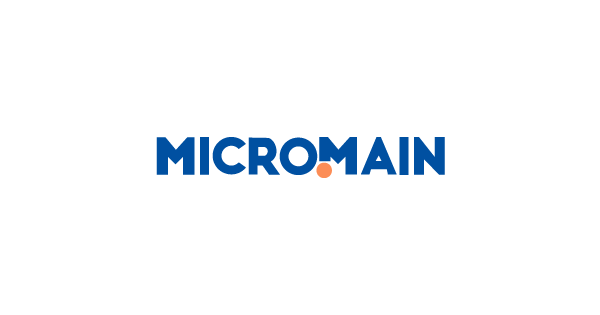How can you manage your manufacturing operations more efficiently and avoid the drain of unplanned downtime? Have you considered the benefits of using CMMS software in manufacturing?
As an industry-leading provider of powerful, flexible, easy-to-use maintenance management software, we at MicroMain understand the pain points of manufacturing companies. High maintenance costs, inefficient inventory management, and lack of reporting capabilities can hamper your organization's growth and productivity. This is where implementing a Computerized Maintenance Management System (CMMS) can make a significant difference.
CMMS software centralizes maintenance information, facilitating maintenance operations in a streamlined manner. It enhances the productivity and efficiency of your maintenance operations, bridging the gap between old-school manual processes and modern, automated solutions.
Here's a snapshot of the advantages of implementing CMMS software in manufacturing:
- Reduced Downtime: CMMS helps schedule preventive maintenance and maximizes machine uptime by catching defects early.
- Cost Savings: CMMS eliminates manual processes by automating maintenance management, leading to significant cost savings.
- Improved Inventory Management: CMMS aids in tracking the number of items in stock and parts used in recent repair work.
- Enhanced Safety Compliance: CMMS improves compliance with manufacturing and safety regulations with its automated audit systems.
Stay tuned as we delve deeper into this topic and shed more light on how a CMMS system can revolutionize your maintenance management. We also bring real-world case studies that demonstrate the successful application of CMMS in manufacturing industries.

Understanding CMMS: Definition and Role in Manufacturing
What is CMMS in Manufacturing?
A Computerized Maintenance Management System, or CMMS, is a powerful software tool designed to simplify and optimize maintenance management in various industries. In manufacturing, a CMMS is a crucial asset that organizes, centralizes, and automates critical maintenance information, thus improving the efficiency and effectiveness of maintenance operations.
Using a CMMS, we can store and manage data related to our physical assets, such as machinery, vehicles, plant infrastructures, communication equipment, and more. This was only possible in the 1980s when maintenance data was generally recorded with a pencil and paper, leading to a reactive rather than proactive approach to maintenance. With the advent of CMMS solutions, we can track work orders, quickly generate accurate reports, and instantly determine which assets require preventive maintenance, leading to extended asset lifespans, improved organization, and ultimately reduced costs and increased profits.
The Role of CMMS in the Manufacturing Industry
In the manufacturing industry, the role of a CMMS is indispensable. It helps us tackle our two significant challenges: ensuring the highest possible machine uptime and complying with manufacturing and safety regulations.
A CMMS assists in maintaining the highest possible machine uptime by providing a centralized way of viewing, diagnosing, and improving asset health. Automating preventive and predictive maintenance (PM/PdM) schedules and providing high-level asset overviews can create a productive manufacturing environment while assuring maximum uptime.
Regarding compliance, a CMMS has robust data-tracking capabilities that help us make responsible equipment decisions to increase compliance with rules and regulations. This ensures the safety of our employees and prevents workplace accidents.
Moreover, a CMMS eases the knowledge load of maintenance technicians. Within a CMMS, you can store PDF versions of user manuals by asset, allowing technicians to access these manuals on-site and providing step-by-step instructions and documentation for repair procedures. This substantially decreases knowledge-based human error.
In short, a CMMS plays a critical role in the manufacturing industry by optimizing maintenance operations, increasing asset lifetimes, reducing downtime, and ensuring compliance with safety standards. The benefits of using CMMS software in manufacturing are vast and impactful, which we will discuss in the following sections.
Key Benefits of Using CMMS Software in Manufacturing
The benefits of using CMMS software in manufacturing are numerous. CMMS can drive operational improvements across manufacturing operations by improving asset performance and enhancing safety compliance. Here are the key benefits of implementing our CMMS software at your manufacturing facility:
Increased Reliability and Reduced Downtime
One of the most significant benefits of CMMS software is its ability to increase machine uptime. With a CMMS, you can organize maintenance schedules for all types of equipment, from large machinery to smaller tools. This ensures regular preventive maintenance, reducing the likelihood of sudden breakdowns and unexpected downtime. For example, the Hoyt Archery Company, a leading bows and archery accessories manufacturer, experienced a 40% reduction in downtime after implementing CMMS software.
Streamlined Work Request Processing and Simplified Record Keeping
Before the advent of CMMS, work order management involved a substantial amount of paperwork and physical file structures. With our CMMS, work orders can be easily categorized and tracked. Employees can submit work requests, and managers can assign these requests to the appropriate technician or team for completion. Plus, our CMMS software can automatically create work orders when certain conditions are met, such as cycle counts of a machine or measurements read by condition monitoring sensors.
Facilitation of Predictive Maintenance through Data Collection
With CMMS, you can transition from reactive to predictive maintenance. Our software helps you collect and analyze data on your assets in real-time, providing insights into potential problem areas within the facility. This allows you to address maintenance issues before they become critical, preventing costly breakdowns and extending equipment lifespan.
Reduced Repair Costs and Increased Safety
Our CMMS can help reduce repair costs by enabling preventive and predictive maintenance. Maintenance managers can use data-driven decisions to reduce asset failures while lowering maintenance costs. Additionally, CMMS can improve safety compliance through audit systems, creating a safer working environment for your employees.
Enhanced Remote Control of Maintenance Operations
Our CMMS software also leverages the latest wireless technology to extend the reach of maintenance operations. Mobile CMMS solutions allow technicians, engineers, and operators to continuously track and respond to critical maintenance issues from anywhere, providing greater flexibility and control.
In conclusion, implementing CMMS software in manufacturing operations can significantly improve machine uptime, maintenance efficiency, safety compliance, and cost savings.
How CMMS Improves Maintenance Efficiency and Effectiveness
CMMS software, like the one we offer at MicroMain, is designed to streamline maintenance management in a manufacturing setting. It achieves this through three primary ways: automation of maintenance management, elimination of manual processes and paperwork, and allowing teams to focus on core tasks.
Automation of Maintenance Management
One of the significant benefits of using CMMS software in manufacturing is its ability to automate various aspects of maintenance management. This includes generating work orders, scheduling maintenance tasks, and allocating resources.
For instance, CMMS software can be programmed to generate work orders automatically based on specific triggers such as time intervals or equipment usage. This proactive approach ensures maintenance tasks occur before problems escalate into significant breakdowns, thus reducing downtime and costs.
Elimination of Manual Processes and Paperwork
Another advantage of using a CMMS in manufacturing is eliminating manual processes and paperwork. With a computerized system, all maintenance information is centralized and easily accessible, which saves time and reduces the risk of errors associated with manual record-keeping.
Furthermore, a CMMS can also be used for inventory management, showing how many of a particular item is in stock and how many parts were used in recent repair work, as mentioned in our previous article. This feature further reduces the time spent on manual inventory checks.
Focus on Core Tasks Leading to Cost Savings and Better Asset Utilization
Maintenance teams can focus on their core tasks by automating maintenance management and eliminating manual processes. This focus leads to cost savings and better asset utilization.
For example, with a CMMS, maintenance technicians don't need to spend time tracking inventory or manually scheduling maintenance tasks. Instead, they can focus on performing the maintenance work, their core competency.
Moreover, by ensuring regular and proactive maintenance, a CMMS can extend the life of your manufacturing equipment, leading to cost savings in the long run.
In conclusion, implementing a CMMS in your manufacturing operations can significantly improve maintenance efficiency and effectiveness. By automating maintenance management, eliminating manual processes, and allowing your team to focus on core tasks, a CMMS can lead to significant cost savings and better asset utilization. Find out more about the benefits of a CMMS.
Industries that Benefit from CMMS
CMMS software isn't limited to just manufacturing operations; it has wide-ranging applications across numerous industries. Here's a closer look at how different sectors can benefit from using CMMS software in their operations.
Manufacturing Industry
In the manufacturing industry, unplanned downtime can result in significant production losses. Utilizing CMMS software can streamline maintenance operations, increase equipment reliability, and reduce downtime, improving overall productivity.
Oil and Gas Industry
The oil and gas industry deals with complex equipment and stringent safety regulations. Implementing a CMMS system can help manage equipment maintenance, enhance safety compliance, and increase the efficiency of operations.
Mining Industry
Mining operations involve challenging environments and heavy machinery. With CMMS software, mining companies can manage equipment maintenance, reduce failures, and ensure worker safety.
Power Generation Industry
Power plants require regular maintenance to ensure continuous and reliable power supply. CMMS software can help manage preventive maintenance schedules, monitor equipment performance, and maintain regulatory compliance.
Shipping Industry
In the shipping industry, vessel maintenance is crucial for smooth operations. A CMMS system can help track maintenance work, manage spare parts inventory, and ensure compliance with maritime regulations.
Fleet Management Industry
A CMMS can help monitor vehicle conditions, schedule preventive maintenance, manage fuel consumption, and reduce overall fleet operational costs for businesses operating a large fleet of vehicles.
Communication & Data Centers
Any equipment failure in communication and data centers can lead to significant data loss. Implementing a CMMS system can help maintain equipment, ensure uptime, and improve overall service quality.
Aviation Industry
The aviation industry requires rigorous maintenance standards for aircraft safety. CMMS software can assist in managing maintenance schedules, tracking spare parts, and ensuring compliance with aviation regulations.
Food and Beverage Industry
In the food and beverage industry, equipment hygiene and uptime are crucial. A CMMS can help manage equipment cleaning schedules, maintain quality standards, and increase production efficiency.
Healthcare Industry
Healthcare facilities rely heavily on medical equipment. With CMMS software, these facilities can effectively manage equipment maintenance, comply with healthcare regulations, and improve patient care.
In conclusion, virtually any industry that utilizes equipment in its operations can leverage the benefits of using CMMS software. At MicroMain, we provide robust, flexible, and easy-to-use CMMS software that can be tailored to meet the specific needs of your industry. Explore more about how CMMS supports various industries.
Case Studies: Real-world Applications of CMMS in Manufacturing
Case Study 1: CMMS in a Large-scale Manufacturing Facility
At MicroMain, we've seen first-hand the impact of our CMMS software on large-scale manufacturing operations. One such example is the case of Harley Marine, a leading provider of marine transportation services.
Harley Marine used our CMMS solution to schedule and track work on their fleet of 70 vessels and over 1,000 assets. The benefits they experienced were far-reaching. They could comply with customer requests for a maintenance history on the vessel they were contracting by running a report in our CMMS. This task was quite challenging before implementation.
Additionally, they found the ease of customization of our CMMS beneficial. They were able to create custom workflows to allow for maintenance schedule deviations when vessels are at sea and generate weekly management reports automatically.
This is just one example of how our CMMS software has transformed maintenance operations in large-scale manufacturing facilities.
Case Study 2: CMMS in a Small to Medium-sized Manufacturing Business
Our CMMS solution has also proven beneficial in small to medium-sized manufacturing businesses. One such example is Athenian Razak, a real estate services company.
Athenian Razak wanted a CMMS system to track tenant requests through resolution and scheduling and to track preventive maintenance activities. They chose our CMMS software in 2009. It tracked maintenance performed on over 30,000 assets at multiple complexes, helping to improve response times and satisfy residents while adhering to budgets. As a result, issues such as backlog and maintenance calls were significantly reduced.
These are just two examples of the benefits of using CMMS software in manufacturing, both in large-scale and small to medium-sized businesses. At MicroMain, we're committed to providing robust, flexible, and easy-to-use CMMS software that supports the specific needs of your industry. Discover more about how our CMMS solutions can support your manufacturing operations.
Conclusion: The Future of CMMS in Manufacturing
As we've thoroughly explored in this article, the benefits of CMMS software in manufacturing are vast and compelling. By automating maintenance tasks, streamlining work order processing, facilitating predictive maintenance, reducing costs, and enhancing remote control of maintenance operations, CMMS continues to reshape the landscape of manufacturing industries.
Looking ahead, the future of CMMS in manufacturing appears even more promising. With the advent of Industry 4.0 and the increased integration of Internet of Things (IoT) technologies, CMMS solutions are set to become even more sophisticated and intuitive. With advanced sensor technology and predictive analytics, CMMS can provide even deeper insights into equipment health and operational efficiency.
In the evolving manufacturing world, CMMS software is an optional tool and a critical component for success. It's an investment that pays off in greater reliability, reduced downtime, and improved productivity. At MicroMain, we are dedicated to advancing CMMS technology to meet the growing demands of the manufacturing industry.
We invite you to explore more about how our CMMS solutions can support your manufacturing operations and join us in shaping the future of manufacturing. Discover more about our award-winning CMMS software, and learn how to get the most from your CMMS.
Adopting a CMMS system is a strategic decision that can transform your maintenance operation and propel your manufacturing business to new heights. And as always, we at MicroMain are here to help you every step of the way.

Further reading: - How CMMS supports manufacturing - Choosing the right CMMS for your organization - Successful CMMS implementation - Industries that benefit most from CMMS
 For immediate assistance, please call us at (512) 328-3235
For immediate assistance, please call us at (512) 328-3235



